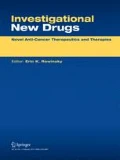Summary
Oral delta-9-tetrahydrocannabinol (THC), 15 mg/m2, was compared to prochlorperazine (PCZ), 10 mg. for the control of cancer chemotherapy-related emesis. Thirty-six patients whose vomiting was refractory to standard antiemetic therapy were entered in this randomized comparative cross-over study. THC decreased nausea and vomiting in 23 of 36 (64%) patients compared to 1 of 36 receiving PCZ. THC efficacy was not dependent on the class of antineoplastic-agent inducing the emetic symptoms, age of patients or type of sensorial change experienced. Using the 15 mg/m2 dose, all patients experienced transient sensorial changes, characterized as a pleasant “high” in 19 or a variable state of dysphoria in 17 cases. This study confirms the usefulness of THC in patients whose chemotherapy-induced nausea and vomiting is refractory to other standard antiemetics. While excellent antiemetic control was achieved at the dosage 15 mg/m2, dysphoria was encountered at this dose level and we recommend that an initial dose of 5 mg/m2 which, if necessary, can be carefully increased to achieve maximum antiemetic benefit.
Similar content being viewed by others
References
Harris JG: Nausea, vomiting and cancer treatment. Cancer 28:194–201, 1978
Whitehead VM: Cancer treatment needs better antiemetics. N Eng J Med 293:199–200, 1975
Moertel CG, Reitemeier RJ, and Gage BP: A controlled clinical investigation of antiemetic drugs. J Amer Med Assoc 186: 116–118, 1963
Sallan SE, Zinberg NE, and Frei E: Antiemetic effect of delta-9-tetrahydrocannabinol in patients receiving cancer chemotherapy. N Eng J Med 293:795–797, 1975
Chang AE, Shiling DJ, and Stillman RC: Delta-9-tetrahydrocannabinol as an antiemetic in cancer patients receiving high-dose methotrexate. Ann Int Med 91:819–824, 1979
Lucas VS, and Laszlo J: Delta-9-tetrahydrocannabinol for refractory vomiting induced by cancer chemotherapy. J Amer Med Assoc 243:1241–1243, 1980
Frytak S, Moertel CG, O'Fallon JR, Rubin J, Creagon ET, O'Connell MJ, Schutt AJ, Schwartau NW: Delta-9-tetrahydrocannabinol as an antiemetic for patients receiving cancer chemotherapy. Ann Int Med 91:825–830, 1979
Sallan WE, Cronin C, Zelen M, Zinberg NE: Antiemetics in patients receiving chemotherapy for cancer: A randomized comparison of delta-9-tetrahydrocannabinol and prochlorperazine. N Eng J Med 302:135–138, 1980
Stanton W: Antiemetic efficacy and safety of delta-9-tetrahydrocannabinol (THC): effect of dose and anticancer regimen. (Abstr). Proc Am Soc Clin Oncol 2:94, 1983
Author information
Authors and Affiliations
Rights and permissions
About this article
Cite this article
McCabe, M., Smith, F.P., Macdonald, J.S. et al. Efficacy of tetrahydrocannabinol in patients refractory to standard antiemetic therapy. Invest New Drugs 6, 243–246 (1988). https://doi.org/10.1007/BF00175407
Issue Date:
DOI: https://doi.org/10.1007/BF00175407




